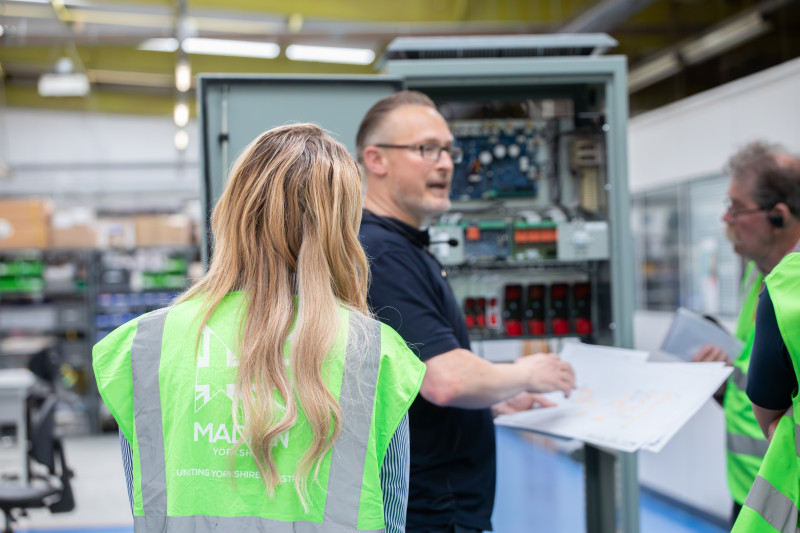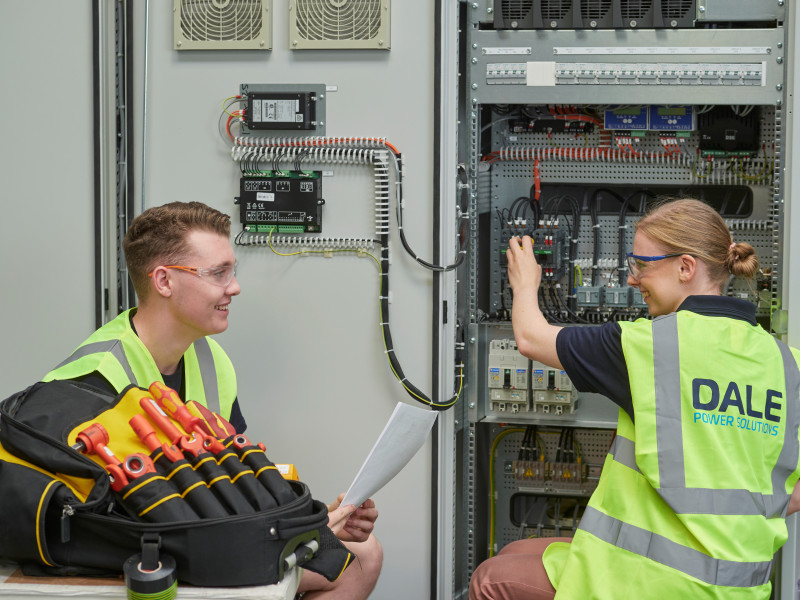Erskine Industrial UPS systems by Dale Power Solutions are purpose-built for high-intensity industrial applications where power failure risks safety, operational continuity, or critical infrastructure. Offering robust AC and DC UPS systems, extended battery backup, and frequency conversion, each solution is tailored to meet the demands of complex environments and customised to your specific operational needs.
Erskine Industrial UPS systems are engineered for extreme environments, from high temperatures and humidity to corrosive or dust-heavy settings. With a 20+ year design life and extended battery runtime, they deliver long-lasting protection where standard systems fall short.
Our Industrial UPS solutions are fully customisable to your site and operational requirements. While Commercial UPS systems offer configurable options, industrial installations are often designed from the ground up, including containerised builds, with comprehensive engineering documentation and detailed quality specifications for every component. This bespoke approach ensures seamless integration with your infrastructure and long-term resilience where it matters most.

Yes, a containerised UPS (uninterruptible power supply) system can be installed on a roof, car park or where space is limited.
Replacement batteries can be purchased for UPS. Replacing the batteries every 3-5 years can extend the lifespan of your UPS. We can advise you on the best battery for your product. We sell a wide range of batteries including: valve regulated lead acid batteries; flooded lead acid batteries; flooded nickel cadmium batteries (NiCd batteries); gas recombination low maintenance NiCd batteries; and lithium ion stationary batteries.
Containerised UPS are housed in standard shipping containers. This makes them easy to transport, and install, and they can be used in a variety of locations, both indoors and outdoors. They typically include all the components necessary for power protetion, such as: UPS system, batteries, bypass switch, air conditioning, power monitoring and fire supression. We can help you customise the UPS to meet the needs of a specific application, such as adding additional batteries for longer runtime or paralleling multiple UPS systems for increased redundancy.
Put simply, yes. A generator service and/or UPS service can determine any existing and future power supply problems that could impact equipment performance. Planned and preventative maintenance can extend machine efficiency, assures optimal working conditions and conserves the life span of the equipment. Along with determining when replacements will be needed for a seamless transition, planned and preventative maintenance is a far cheaper solution compared to complete equipment replacement.
When a power outage occurs, a UPS will immediately switch to battery power to provide a continuous power supply to connected equipment. However, the UPS batteries have a limited runtime, so a generator is needed to provide long-term power protection. When initiated the UPS will send a signal to the generator to start up. Once the generator is running, the UPS will switch to generator power. When the power outage is over and grid power is restored, the UPS will return to utility power and recharge its batteries. The generator will then shut down.
When disruption to your power occurs it will provide instantaneous protection by immediately resorting to the onboard battery which forms part of the uninterruptible power supply.
Nearly all electronic and electrical equipment, regardless of how well-designed and built it is, will eventually break down unless it is maintained according to the manufacturer’s instructions. Wear and tear is common with electrical equipment, but it has severe consequences for UPS systems and generators, where financial, reputation and potentially life-threatening damage comes into play. It is highly recommended that as a minimum you service your power systems annually in order to maintain its working lifecycle. Our service contracts include everything from AC maintenance, DC maintenance and generator maintenance through to analogue metering, intelligent monitoring, remote monitoring and spare parts, as well as callouts, minor fault fixes and access to our customer portal, where you can access management information reports and other key details on your power supply systems.
UPS manufacturers usually recommend that UPS maintenance should be carried out within the first year of installation, and then annually from there on out as a minimum. However, if you notice any issues with your UPS system beforehand, then you should always contact your power supply partner as soon as possible to rectify them, and to ensure that UPS repairs are carried out swiftly and efficiently. The right check up could be the difference between business continuity and costly downtime, so UPS maintenance is always worth the time and effort.
Batteries have a typical lifespan of 3 – 5 years, with causes of battery failure including loss of electrolyte and inaccurate float charge voltage. However, factors such as battery chemistry, battery cycling and suitable storage conditions can greatly affect how long your battery lasts. We strongly recommend carrying out battery maintenance tests to keep abreast of any battery faults or issues, as batteries are one of the most integral parts of your UPS system. Battery testers can visit your business, site or facility every 6 months to a year, ensuring you’re always in control of your critical power equipment.
As batteries go unused, with no charging schedule, their battery life will decrease. When it comes to the self-discharge characteristics of lead-acid batteries for example, it is important that they are charged after 6-10 months of battery storage. Otherwise, permanent loss of capacity will occur between 18-30 months.
A generator provides standby power until the mains power can be reinstated during a power outage. This is supported by a UPS (Uninterruptible Power Supply) which ensures a seamless transition from your mains power to your backup power supply. Batteries provide power to your UPS and generator.
Upon installation, the UPS requires further attention before it is fully operational. Certain connections, components and peripherals need to be checked and tested to ensure that the UPS works as designed. Once these checks have been completed, the UPS can then be commissioned and will operate at optimum performance without the need for more tests.
UPS maintenance is extensive and far-reaching, and when carried out by our technical team, is highly successful. UPS maintenance involves the testing and inspection of your UPS systems, and making any necessary adjustments for power continuity. A visual inspection of the area surrounding your UPS and battery equipment will typically be carried out first, with UPS maintenance seeking to identify any operational abnormalities. Following this, we can carry out battery maintenance, battery management, enclosure maintenance and load bank testing, as well as control system management, voltage testing, and replace faulty parts with new ones. This can include batteries, capacitors, alternators and fans.
An uninterruptible power supply (UPS) provides a source of power for the equipment it protects. If there is a disruption to power, the UPS has an on-board battery to automatically supply to electrical equipment until the disruption is over or back-up generators kick-in.
WIMES (Water Industry Mechanical and Electrical Specifications) UPS (uninterruptible power supply) is a robust critical power system built for harsh atmospheres such a dusty environments, moisture and humidity, as well as extremes in temperature and sites where robust solutions are required. They are available for both industrial and commercial applications.

Speak to our Industrial UPS specialists today and discover how Erskine systems can protect your operations, whatever the environment.